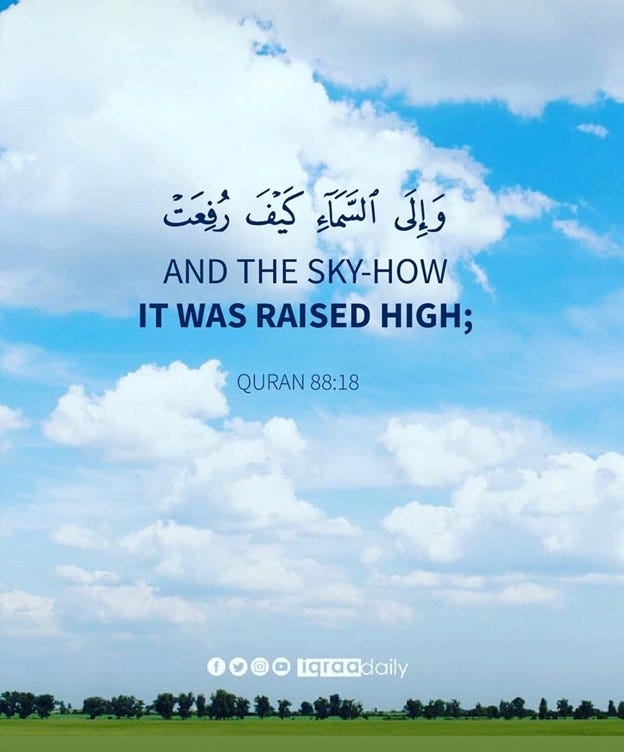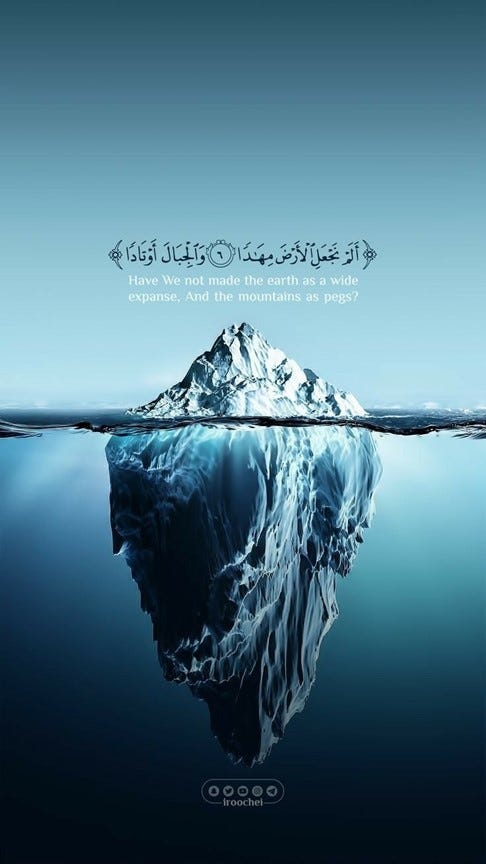FBF #24: This World of Dew
Reflections on how organic metaphors from the Quran can help process a sudden death
This haiku by Koboyashi Issa is one of my favorite poems.
This world of dew
Is just a world of dew—
And yet
He wrote it on the one year anniversary of the death of his young son, and it speaks to the impermanent and transient nature of this world.
Just like a dew drop, which forms overnight, has one glorious moment of perfection, and is then reabsorbed into the cycle of life, so too is our time in this world.
A dew drop seems so tiny, so insignificant. It is not something worth becoming attached to. And yet… And yet, that tiny droplet of dew contains our entire lives—all our hopes and fears and loves and grief.
This week, I am processing the sudden death of a dear friend. While we met on the tennis court, our conversations meandered from the philosophical to the scientific to the religious. He used to send me thoughtful comments about these newsletters and was the one of the first people I would turn to when I felt stuck.
In trying to make sense of his passing, I keep returning to this poem. His world of dew has evaporated, leaving us only memories of its fleeting beauty.
During trials like these, I often find poetry, particularly those that explore organic metaphors, a balm for the soul. Throughout the Quran, Allah instructs us to ponder His creation to strengthen our faith and to find solace.
In this spirit, for this week’s FBF I will look to four verses of Surah Ghashiyya (the Overwhelming) to try to derive some lessons to process this tragedy.
The surah begins with a vivid description of the Day of Judgement, the downcast faces and agony of the unfortunate and the unbridled joy and recompense of the believers. Then, as if anticipating doubts about this discussion of the unseen, God turns our attention towards signs in His creation that we can see and touch.
He asks:
Do [those who deny the Day of Judgement] not look at:
a) The camels and how they were created?
b) The skies and how they were raised?
c) The mountains and how they are fixed firm?
d) The earth and how it is spread out? (88:17-20)
To me, these verses point to qualities that we need to develop in order to find an equilibrium as we struggle within our drops of dew.
1) The Patience of a Camel
Sabr, or patience, is the main quality we must exhibit during times of grief, and the camel represents the quintessence of patience.
The camel is perfectly adapted to the harsh climate of the desert and can cross hundred of miles of the earth’s most barren stretches step after step, without ever complaining. The camel is in it for the long haul, storing up water and fat during times of plenty that it can rely on when food and drink become scarce.
Its eyelashes are built to ward of the blowing of the sand, and its fur is perfectly designed to allow it to withstand the intense heat and coolness of the desert. When it comes time for a human to mount it or strap an enormous load to its back, it patiently lowers itself onto its callused knees, which are perfectly designed to endure the scorching sand.
In short, the camel is a patience machine, and we can learn much about soldiering on during times of trial and tribulation by reflecting on its creation.
2) The Height of the Skies
Nothing reminds us of how small we are than looking up at the sky and pondering on the vastness of the Creation.
In his essay entitled The Liberation of Cosmic Insignificance Theory, Oliver Burkeman reminds us that in the grand scale of the universe, our individual lives are minuscule and ultimately insignificant. It challenges the notion that our existence must be marked by grand accomplishments or lasting impact to be considered meaningful. Instead, it invites us to find value in the ordinary, everyday moments of life.
When God turns our attention to the height of the skies, He helps us to make peace with our finite time in this world by pointing us towards the seemingly infinite.
In the face of adversity and sudden loss, the vast expanse of the skies teaches us to rise above our circumstances and seek solace in the larger picture of life.
3) The Humility of the Earth
The earth is nothing if not humble. It endures galling injustices at the hands of man, who spit on it, clear cut its forests, and gouge it to extract minerals. It has lived through natural disasters, ice ages, and mass extinctions. Its breathtaking landscapes evoke a deep sense of humility in mankind by reminding us of our relative insignificance.
Humility comes from the root word humus, which means fertile earth and soil. Indeed, the word human comes from this same root, which is appropriate because mankind was fashioned from earth where it will ultimately return, as laid out in Genesis 19: “for you are dust, and to dust you shall return.”
In the words of Tim Burkett:
“Humility forces you to go all the way to the fertile ground, not stick up like you're some big deal because you've got something that others don't have. When you sink all the way to the ground you actually are a Big Deal--not because you are you but because you are not you. You've sunk down to the fertile ground of all being… Humility is realizing in a visceral way that we are not separate from anything else. It allows us to sink down into the rich soil, all the way to the bottom.”
Sudden deaths of those close to us seem so personal, yet we must display humility during these times. We must humbly acknowledge that we will never understand why things happen the way they do and instead pray to God in the words of the Serenity Prayer read at every AA meeting, “God, grant me the serenity to accept the things I cannot change/The courage to change the things I can/And the wisdom to know the difference.”
4) The Steadfastness of the Mountain
Much like trees and icebergs, there is much more to mountains than meets the eye. They have “roots” that extend deep into the crust of the earth.
In another verse, Allah says “[Have we not made] the mountains as pegs?” (78:7) Geologists have confirmed that mountains are critical in maintaining the stability of the earth’s surface, akin to giant tent pegs that help the world keep its shape.
Mountains teach us steadfastness. They are whipped by wind and rain and snow yet always remain firmly rooted. They are models of endurance.
Sudden deaths are inherently destabilizing, but the stoic example of mountains can help us remain steadfast and grounded when the world under our feet has shifted.
5) A Blank Space
I have decided to leave the fifth point blank this week to symbolically represent the emptiness in my heart caused by the passing of my friend. This one is for you, Mike. I miss you.









I read this very slowly, Hamzah. I held my phone as reverently as I could with my two hands. And I was fortunate enough to be looking out at the ocean in all of its expanse and depth while doing so - perfect for your deeply thought sentiments about Mike, and life. I have fond memories of his quiet, thoughtful way. Thank you for sharing as you have here, my friend.
You are grappling with life’s most essential question, “What is life if not unpredictable change?” Yet, the rich fertile soil left by those who have returned to dust is precisely that from which new life is born.